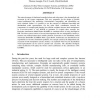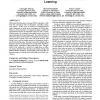85 search results - page 14 / 17 » QUICR-Learning for Multi-Agent Coordination |
CCIA
2009
Springer
13 years 8 months ago
2009
Springer
Abstract. Social conventions are useful self-sustaining protocols for groups to coordinate behavior without a centralized entity enforcing coordination. The emergence of such conve...
ATAL
2006
Springer
13 years 11 months ago
2006
Springer
We present a logic for reasoning both about the ability of agents to cooperate to execute complex actions, and how this relates to their ability to reach certain states of affairs...
DAGSTUHL
1994
13 years 8 months ago
1994
The main advantage of distributed controlled robots and subsystems is the decentralized task execution by the system components. This way, properties for the design of flexible co...
ATAL
2010
Springer
13 years 8 months ago
2010
Springer
Memory-bounded techniques have shown great promise in solving complex multi-agent planning problems modeled as DEC-POMDPs. Much of the performance gains can be attributed to pruni...
ATAL
2009
Springer
14 years 1 months ago
2009
Springer
Multi-Agent Reinforcement Learning (MARL) algorithms suffer from slow convergence and even divergence, especially in largescale systems. In this work, we develop an organization-b...


